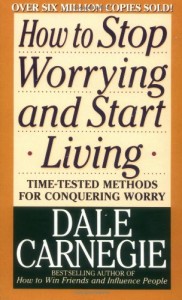 I was recently trying to cull my slightly out-of-control book collection and pulled this book off the shelf. It had been years since I’d read it and thought I might give it a quick reread just to see what would stand out. I’m glad that I did.
I was recently trying to cull my slightly out-of-control book collection and pulled this book off the shelf. It had been years since I’d read it and thought I might give it a quick reread just to see what would stand out. I’m glad that I did.
Right now, most self-help books are either reports on the latest neuroscience findings or the meandering thoughts of the latest guru. It would be easy to dismiss How to Step Worrying and Start Living as a dated relic of the last century, but then you’d miss out an a valuable read.
How to Stop Worrying and Start Living is a little different. Dale was a great storyteller, and he was fanatical about collecting ideas and recollections from around the country. His approach offers wisdom in a manner that is easy to wrap your head around. Some of the thoughts and admonishments seem a little funny half a century later, but a lot are grounded in simple ideas and common sense.
Big Thought
“Our trouble is not ignorance, but inaction. The purpose of this book is to restate, illustrate, streamline, air-condition, and glorify a lot of ancient and basic truths – and kick you in the shins and make you do something about applying them.” (preface)
Implications, Ideas, and Questions
- I often write down the ideas that books stir within me and the questions that they inspire. Instead, I’m just going to list my favorite rules that Dale summarizes at the end of various chapters. Hopefully, they’ll help you. And this will help me when I’ve forgotten and gone off track…
- Part 1, Rule 2: The Magic Formula of Willis H. Carter:
- Ask yourself, “What is the worst that can possibly happen if I can’t solve my problem?”
- Prepare yourself to mentally accept the worst – if necessary.
- Then calmly try to improve upon the worst – which you have already mentally agreed to accept.
- Part, 3, Rule 3: Use the law of averages to outlaw your worries. Ask yourself, “What are the odds against this thing’s happening at all.”
- Part 3, Rule 6: Let the past bury its dead. Don’t saw sawdust.
- Just For Today
- Part 4, Rule 3: Instead of worrying about ingratitude, let’s expect it. Let’s remember that Jesus healed 10 lepers in one day – and only one thanked him.
- Part6, Rule 1: Unjust criticism is often a disguised compliment. It often means that you have aroused jealousy and envy. Remember that no one ever kicks a dead dog.
- Part 7, Rule 1: Rest before you are tired.
Should You read this book? Who should read this book?
Worry is a relatively universal human challenge, and I think most of us could stand to worry a little less. You could be a CEO or a beginning account manager, and worry is just as likely to rear its head.
I’ll keep it simple:
Are you a worrier? Than this book is a good investment of your time. Even if you only take away one tool from the reading, it will be worth it.
